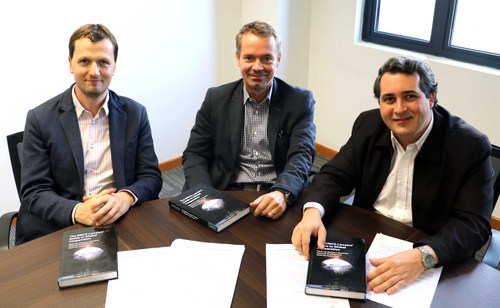 UM scholars publish first book on legal cooperation of BRICS countries
UM scholars publish first book on legal cooperation of BRICS countries
The BRICS-Lawyers' Guide to Global Cooperation, a book co-edited by three faculty members from the University of Macau (UM) Faculty of Law, namely full professor Rostam J Neuwirth, assistant professor Alexandr Svetlicinii, and senior instructor Denis de Castro Halis, was published by Cambridge University Press in September 2017, following the Ninth BRICS Summit, which was held in Xiamen, China, from 3 September to 5 September 2017.
The book contains 16 chapters written by international experts on a broad range of aspects of legal cooperation of BRICS countries (Brazil, Russia, India, China, and South Africa), including trade, investment, competition, intellectual property, energy, consumer protection, financial services, space exploration, and legal education. It is a valuable reference book for academics, government officials, legal practitioners, business executives, researchers, and students.
The publication promotes legal cooperation among BRICS countries in the following two ways. First, it provides a comparative analysis of the national legal regimes in the BRICS countries (such as trade, investment, competition, consumer protection, and dispute resolution), which can be used as reference by scholars and practitioners alike. Second, book contributors elaborate on the future directions of BRICS countries’ cooperation in certain areas (such as development assistance, intellectual property, energy, financial services, culture, and legal education). The book can serve both as a textbook for law students and as a reference book for scholars and policy makers.
The annual BRICS Summit is a high-level meeting of political leaders of BRICS countries. In 2017, the BRICS Summit was hosted by China in the coastal city of Xiamen, Fujian province, and was attended by Brazilian President Michel Temer, Russian President Vladimir Putin, Indian Prime Minister Narendra Modi, Chinese President Xi Jinping (host), and South African President Jacob Zuma. The BRICS leaders discussed various aspects of international cooperation and at the conclusion of the summit issued Xiamen Declaration, which specifies the consensus reached on various issues. For example, BRICS leaders reiterated their support for BRICS University League and BRICS Network University in collaborating in education and research, and welcomed efforts to promote cooperation among educational think tanks, as well as exchanges among youth, by, among other means, organising youth summer camps and offering more scholarship opportunities to BRICS students.


